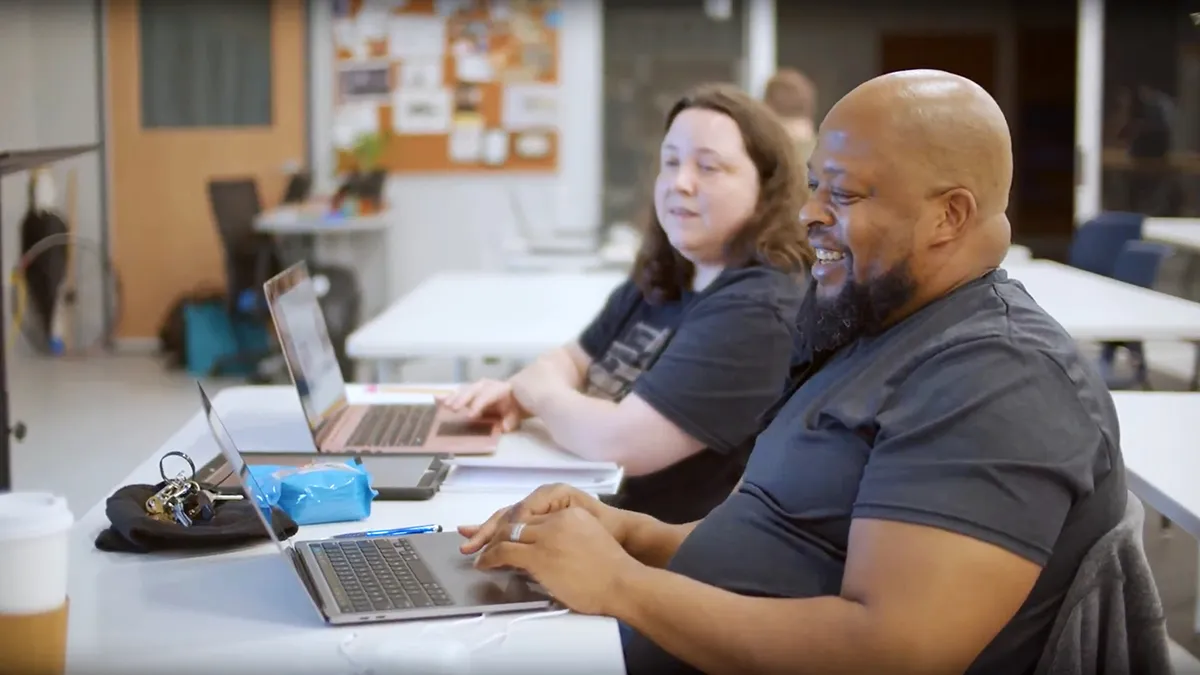
Code Labs
Tech Education and Training Programs
For individuals hungry to enter or upskill in the growing tech industry, we have comprehensive education and training programs that combine our unique expertise with a powerful mission—to eliminate opportunity gaps by providing access to the tools and resources individuals need to thrive across Missouri.
The Code Labs Difference
Built by Tech Pros, for Tech Pros
In today's tech landscape, access to tech education and resources should be readily available to all which is why we've built a no-cost tech education and training program full of course offerings that range from coding for beginners to upskilling tech pros in their current role. Together with our amazing team of code coaches, employers, and partners, we're ready to give you the skills, experience, and wrap around support needed to help you build something great!
What We Teach
Our expert-led course offerings span from the fundamentals of programming, full-stack web development, AI, data science, and quality assurance. Whether you're the new kid on the [coding] block or a seasoned pro looking to upskill—invest in yourself and unlock your tech potential.
An introduction to coding involves grasping key concepts like variables, data types, control structures, and algorithms. These building blocks form the foundation for writing efficient and logical code to solve problems and create software applications. Participants will walk away with a solid understanding of HTML, CSS, and JavaScript.
Foundational knowledge learned in our intro course prepares students for more advanced programming courses such as our Full-Stack Web Developer program. Upon completion of our fundamentals course, participants qualify for admission into our full-stack web developer program.
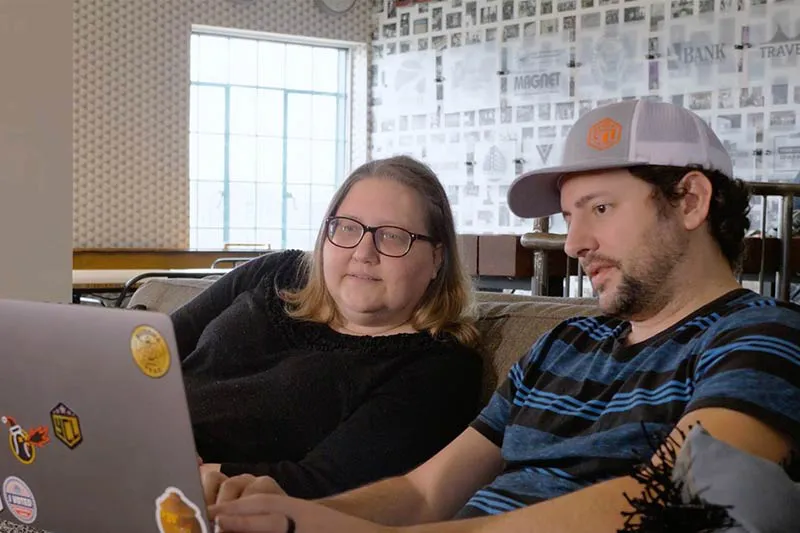
What you can expect to know after completing our intro course:
- Introduction to Fundamentals of Programming
- Build a Development Environment
- Introduction to HTML
- Introduction to CSS
- Introduction to JavaScript
- Build a Project: Bringing it all together!
Ready to get started?
Designed to teach participants how to build both the front-end and back-end of web applications, our full-stack web developer program gives students the skills, knowledge, tools, and resources to make a website or application function properly. Curriculum and course materials focus on HTML, CSS, JavaScript, Angular, Node.JS, SQL, Express.JS, React, and more.
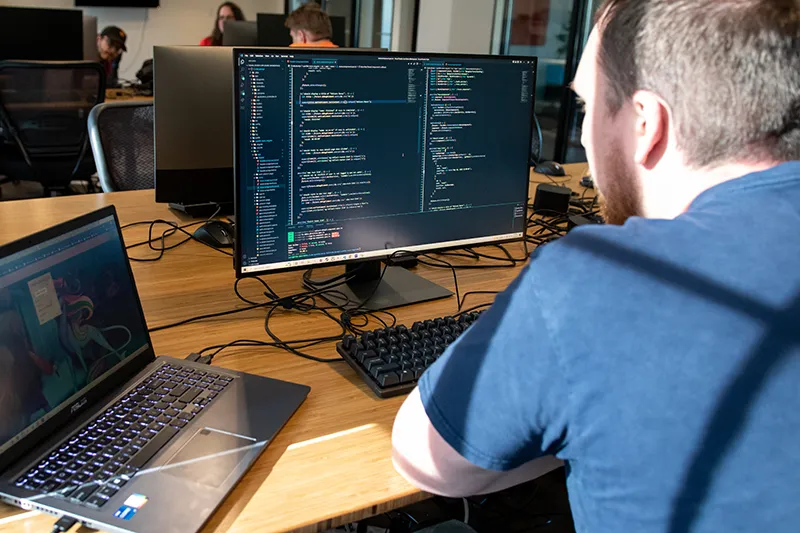
Topics and activities you can expect to learn and have a solid understanding of after completing our full-stack course include:
- Front-end languages and tools needed to create what users see and how they could interact with a website or a mobile application.
- Back-end logic on how software applications work behind the scenes to produce desired contents or results.
- Databases and understanding how user information is stored and setting things up in the cloud.
- Employer Capstone Projects play a significant role in the last few weeks of the course giving students a chance to showcase their learnings and new skillsets while working alongside a local tech employer.
*Those interested in applying for the full-stack web developer program must successfully complete the fundamentals of programming course.
Gives participants the skills to leverage generative AI to design, develop, translate, test, document, and launch applications and their code. Gain hands-on experience using generative AI tools and models, such as GitHub Co-pilot, Open AI ChatGPT, and Google Gemini, for various software engineering tasks.
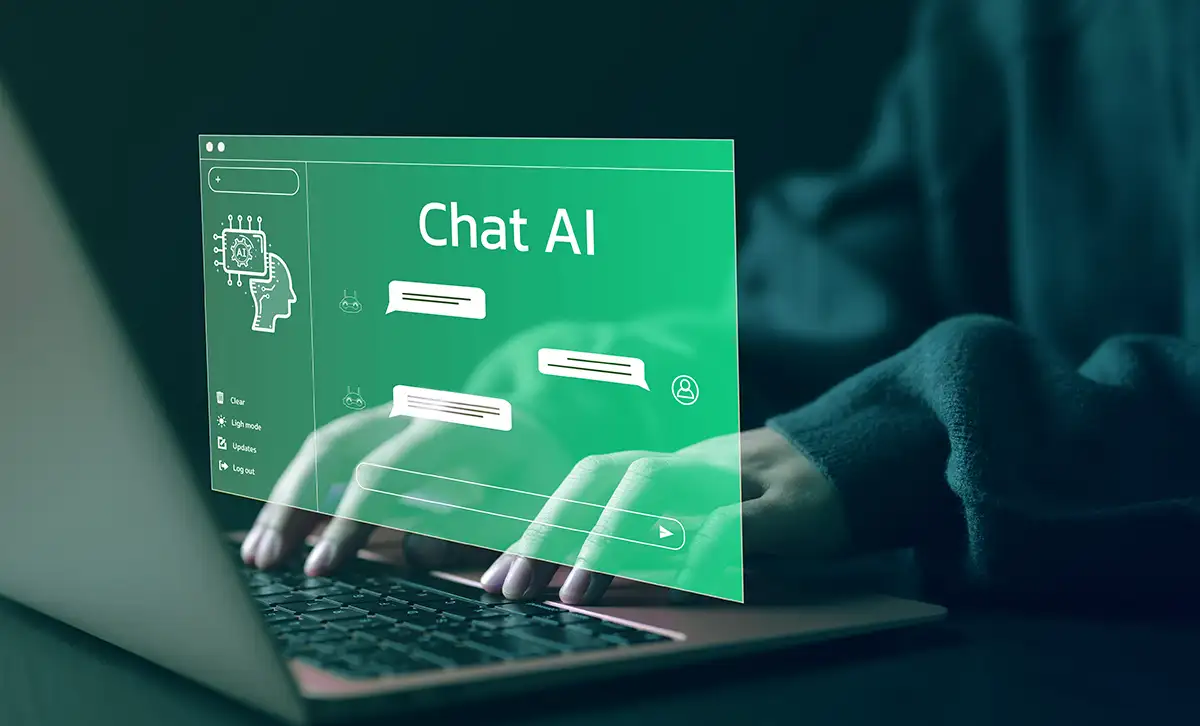
What you can expect to know after completing our artificial intelligence course:
- Identify real-world generative AI uses and describe popular generative AI models and tools for text, code, image, audio, and video
- Explain generative AI prompt engineering concepts, examples, and common tools and learn techniques needed to create effective, impactful prompts
- Learn about tools and techniques to generate code snippets, scripts, test cases, and applications using generative AI models
- Develop innovative software engineering solutions using AI-powered tools and LLMs
Trainees will acquire skills to extract valuable insights from large datasets to inform decision-making and enhance product functionalities. This includes proficiency in programming languages like Python or R, familiarity with data manipulation and visualization techniques, and an understanding of statistical methods and machine learning algorithms.
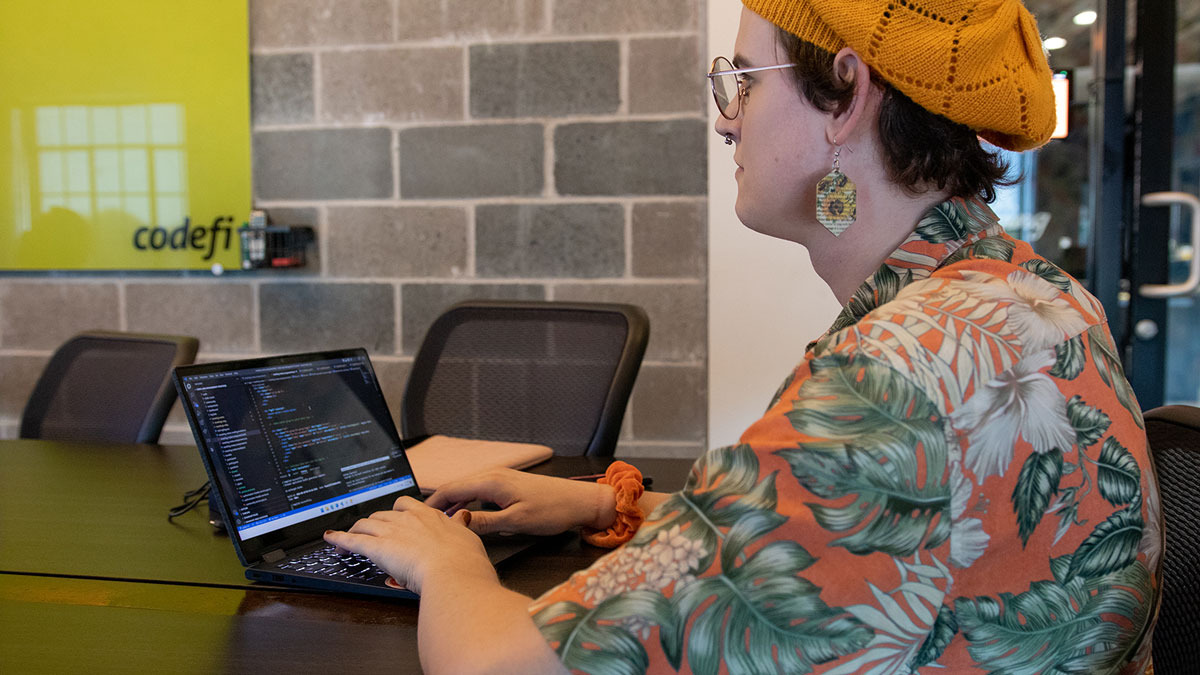
What you can expect to know after completing our data science course:
- Gain an understanding of the practices and processes used day-to-day by a data analyst
- Learn key analytical skills and tools
- Understand how to clean and organize data for analysis, and complete analysis and calculations
- Grasp how to visualize and present data findings in dashboards, presentations and commonly used visualization platforms
Learn the techniques to ensure that software products meet predefined standards and requirements. It includes testing methodologies, automation tools, and process improvements to enhance the reliability, usability, and performance of software applications.
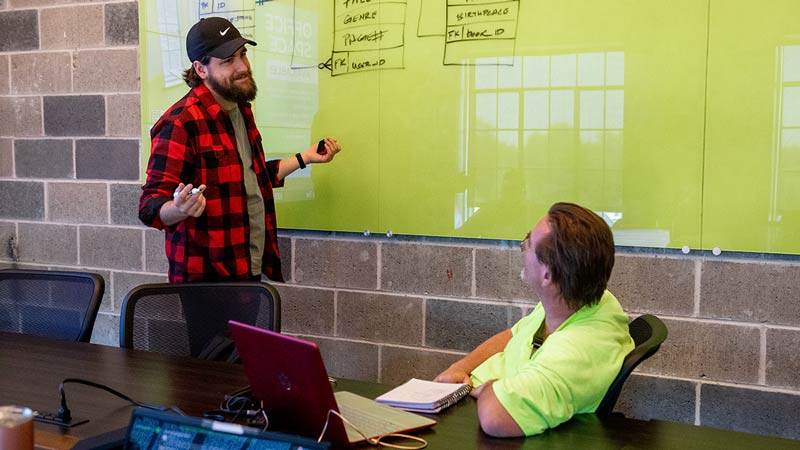
What you can expect to know after completing our quality assurance course:
- Understand the responsibilities and qualifications for the role
- Common types of Software Testing
- Identify common types of software testing
- Write test cases
- Gain knowledge on the difference between frontend testing and backend testing
- Learn about Structured Query Language (SQL)
- Become familiar with additional skills and tools used by software quality engineers
Participants will learn to build a responsive Expense App using Power Apps on top of a Dataverse table, incorporating conditional controls for enhanced functionality.
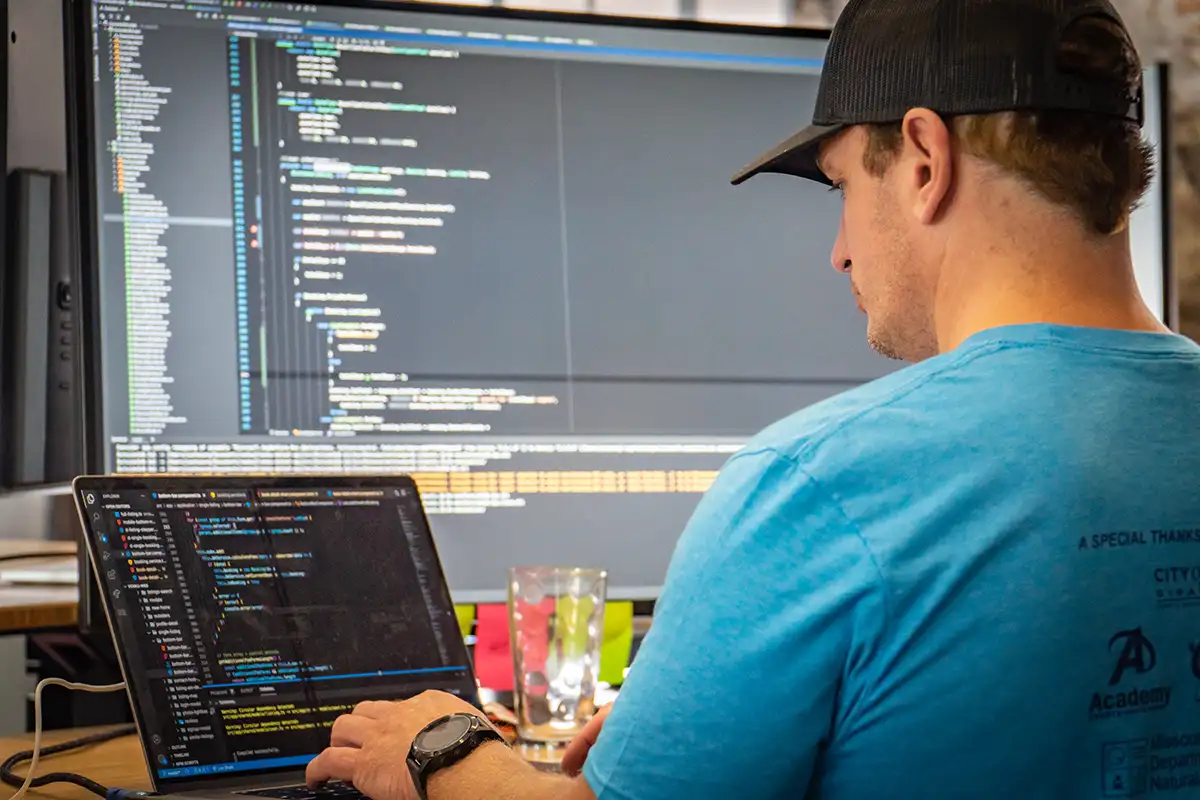
Keys objectives you can expect to learn after completing this Power Apps course:
- Introduction to Power Apps and Dataverse where you'll gain an understanding of Power Apps capabilities and the role of Dataverse in managing data.
- Setting up the expense table by creating a Dataverse table specifically for tracking expenses and defining necessary columns.
- Building the main screen by adding basic controls and binding them to Dataverse data, displaying data in a gallery, and performing CRUD operations on expense entries.
- Implementing responsive design helping you learn the principles of responsive design and how to apply them to ensure the app works well across all devices.
- Conditional controls covering the use of the If function to show or hide controls based on specific conditions and changing control properties.
The journey of switching careers, advancing up the ladder, or building on your current skill set isn’t always a straight path. Wherever you are on your journey, we're happy to chat and determine how we can help. Schedule time with our team.
Don't Just Take Our Word for it
-

“Code Labs prepared me to enter a field in which I had little to noprevious experience, opening the door for me to learn and explore new career paths. Upon completing this program, I was quickly able to put myself and my family in a better position and achieve a greater work-life balance in the process.”
- Patrick O.
2022 Alum -

“The Code Coaches are an invaluable part of the program. Having an experienced developer there to guide you, rather than give the answers, was everything. The slight pushing and leading in the right direction created an enhanced learning experience.”
- Joseph W.
2023 Alum -

“The best part is that I don't have to wonder about what the future holds anymore because the career possibilities are honestly limitless. I get to exercise my love of puzzles and problem-solving every single day, and I wouldn't trade it for anything.”
- Zelda M.
2022 Alum -

“The classroom learning style was appealing to me and the curriculum was a great way to supplement my other education within the tech field. I appreciated the accessibility the Code Labs program provides from a financial aspect because courses and/or boot camp-type environments in the computer science field can be very costly.”
- Bri G.
2022 Alum -

“The flexibility of the program worked well for a work and family schedule, allowing me to work on classwork when I had time and still spend time with my family. The in-group work aspect was another big draw, being able to work with others that were also learning the material and then working together to build projects together was of tremendous help in solidifying the material for me.”
- David W.
2022 Alum -
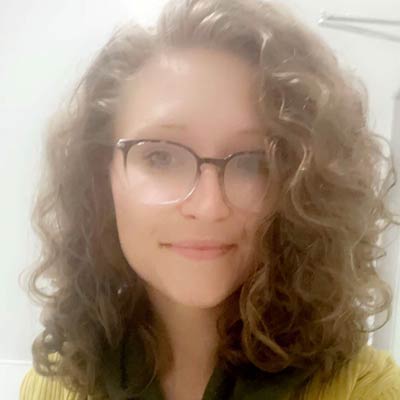
“A big reason I went with Code Labs over any other program was that it's completely free. Paying thousands of dollars to go to a boot camp wasn't feasible for me when I started this program. I love the rural source employment network. Working on and getting paid for a real project is going to look great on a resume and I'm learning things from a perspective I probably never would have had I not been given this opportunity.”
- Ashley L.
2022 Alum
Our Programs in a Nutshell
Virtual or In-Person Delivery
No Cost, Part-time
Employer Capstone Projects
Paid Work Experiences and Apprenticeships
Career Services and Employment Readiness
Pair Programming
Beginner Courses and Upskilling Workshops
Employer-led Curriculum
Upcoming Course Dates
In-person courses will be held in Cape Girardeau, Missouri, from 5:30-8:30pm.
Jun
2024
Required intro course for enrollment in Full-Stack Web Development
Jul
2024
- July 22 (In-person)
- July 29 (Virtual)
Jul
2024
- July 25 (In-person)
- August 1 (Virtual)
Aug
2024
- August 8 (In-person)
- August 14 (Virtual)
Aug
2024
- August 22 (In-person)
- August 29 (Virtual)
Jan
2025
Requires Fundamentals of Programming course completion
Apply Above

Shoot me a message here!
Enter your question below and I will get right back to you as soon as possible!
By submitting, you agree to receive SMS or e-mails for the provided channel. Rates may be applied.
Frequently Asked Questions
Frequently asked questions pertain to the Full-Stack Web Development program only.
We offer a variety of courses so depending on which course you are interested in will further help determine whether you are a good fit. Our Fundamentals of Programming course does not require prior coding experience. Those who wish to apply for our Full-Stack Web Developer program must complete the Fundamentals of Programming course as a prerequisite.
Our crash courses are available with the intent to help professionals in the tech industry upskill their current skill set.
Ultimately, if you are looking to switch careers, advance up the ladder, or build on your current skill set, then our program offerings are right for you!
How we select applicants to receive scholarships is assessed on the following criteria:
- Application form submitted
- Pre-requisite work completed (if required, depending on course)
- Available time to spend on program activity
- When enrolling students, we strive to assemble a class that reflects the broader community and represents a diverse array of backgrounds.
- Removing barriers to tech education and skills training.
- Helping turn those skills into a career or upskilling pros already in the industry.
- Keeping tech talent local to regions across Missouri.
Although the Fundamentals of Programming course is self-paced, it does have a completion date so the work must be complete by the noted deadline.
For our Full-Stack Web Developer program, most students will need to commit at least 20 hours per week to in-class and at-home work.
Time commitment varies for our crash courses but because they are designed for upskilling, the course time commitment strives to accommodate full-time working professionals.
If access to a laptop is keeping you from applying to our program, please contact our team at [email protected].
Code Labs is a no-cost local tech and education training program provided by experienced tech professionals across rural communities in Missouri and beyond. Our course focused on full-stack web development equips participants with the skills, practical experience, and job readiness to prepare them for high-salary, high quality entry-level software developer careers. Our crash courses are designed to help professionals already in the tech industry upskill their current skill set.
The success and growth of Code Labs is due to its innovative organization, delivery, and employer integration. Courses in the program are part-time, allowing participants to continue earning while learning, and the hands-on practical curriculum is delivered with blends of online learning and local face-to-face instruction. Uniquely, our instructors are pros in the tech industry, who are engaged in the use of modern languages and tools, and dedicated to around-the-clock support of trainees.
Code Labs is owned and operated by Codefi, a group of tech entrepreneurs located in southeast Missouri who partner with private and public groups to deploy an innovation ecosystem to train digital workers and entrepreneurs, build and attract software-focused companies, and create community spaces to expand the digital economy in rural communities.
Codefi’s mission is to eliminate the skills and opportunity gaps preventing workers and entrepreneurs in rural regions from thriving in the digital economy. In strong digital economies, workers drive innovation and become entrepreneurs, creating local wealth, more economic diversity, and future-proof jobs and occupations.